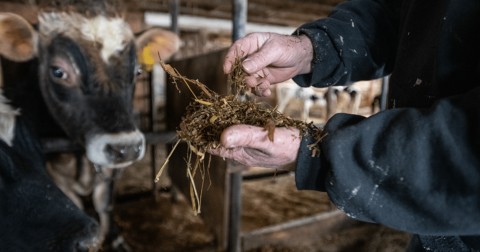Explainer
How To Explain Lab-Grown Meat Simply to People Who Aren’t Scientists
Food•10 min read
Reported
A new report finds investigations at an all-time low at a time when farm workers, including children, are perhaps more vulnerable than ever.


Words by Grace Hussain
A new report from the Economic Policy Institute reveals that the federal government is failing to adequately protect one of society’s most vulnerable groups — farm workers. Despite promising to be “the most pro-worker and pro-union President in American history” the Biden Administration lags behind his predecessor, as farm labor investigations hit an all-time low.
Just this week the administration rolled out a series of new protections for agricultural workers, but these would mean little without oversight and enforcement. Past investigations have uncovered some of the most egregious labor violations happening in the food system — including child labor abuses and filthy housing quarters — conditions described as “labor camps surrounded by electric fencing” and “unsanitary mobile homes with raw sewage leaks and no access to food or safe drinking water.”
The U.S. does provide legal protections for farmworkers in the U.S. — including the Fair Labor Standards Act and the H-2A visa program. Though there are exceptions — like the agriculture industry’s use of prison laborers — farmworkers are entitled to minimum wage and payroll records, regardless of their immigration status. Temporary workers under H-visas have rights to safe housing and meals.
The Labor Department is responsible for oversight of these laws, but the division responsible for on-farm inspections is conducting fewer than ever, the Economic Policy Institute found. In 2000, the division carried out 2,431 inspections of agricultural operations. But that number has steadily dwindled since then, and in 2022, regulators hit a record low: just 879 assessments.
When investigations are actually carried out, they uncover abuse. Previous research conducted by the economic think-tank found that 70 percent of all farm investigations revealed violations — — chief among them wage theft and failure to provide adequate housing.
While farm worker investigations may be dwindling, the number of immigrants invited to the country to work in agriculture is on the rise. In 2021, more than 32,000 applications to recruit workers via H-2A and H-2B visas were approved by the Department of Labor.
Most U.S. farm workers are here under the H-2A visa, and it’s these laborers who most often have their rights violated, according to this latest report. While the H-2A visa program does provide a pathway for immigrants to legally and temporarily work in agriculture, workers are often afraid to report violations — in some cases exposing them to slavery-like conditions with no other options for staying in the country.
A similar visa program, H-2B, allows slaughterhouses and meat packing plants to recruit immigrants to work in an industry where an average of 27 workers per day suffer amputation or hospitalization.
The meat and dairy industries employ many H-visa holders — estimates suggest that, in 2017, they employed 600,000 H-2A visa holders, for instance. The dairy industry relies particularly heavily on immigrant labor, with experts estimating that roughly half of all dairy workers were born outside the country. And because dairies need staff year round, dairies often turn to undocumented immigrants who are not protected by the inspection requirements of temporary visa programs.
Farm operators are increasingly hiring minors for dangerous work too. Lax labor laws allow children as young as 12 to work in agriculture, and those as young as 16 to operate heavy machinery, likely contributing to the high numbers of children now dying on farms. Even though farms employ less than 6 percent of child laborers for instance, the industry is responsible for more than half of work-related deaths for children, according to government data.
In one of the few investigations carried out by the Labor Department division, over 100 children, some as young as 13, were illegally working for Packers Sanitation Services, Inc. After spending their nights cleaning slaughterhouses, the investigators found they spent their days sleeping through school due to exhaustion.
The kids, who hail from various Central American countries, were likely provided with false identities by smugglers who then brought them into the country before placing them in jobs with multiple companies in the meatpacking industry.
Yet according to this latest report from the Economic Policy Institute, fewer than 1 percent of farms are investigated, which means farm owners and operators can continue to violate laws with little fear of retribution.